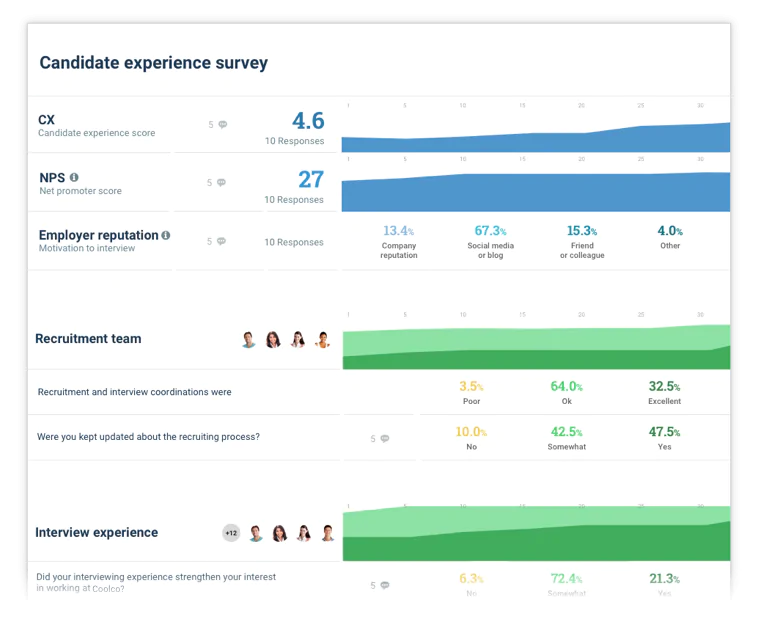Recruiting is hard. Prospective employees have lots of options in today’s competitive market, particularly for high demand positions. But what can be overlooked is that what they think of your company throughout their job search can impact their – and others’ – level of interest and eventual decisions.
In prior posts, we’ve introduced and dug deep into the concept and importance of “candidate experience” (“CX”). What’s that? Think of CX as relating to how job applicants engage with your company during all aspects of the recruiting and hiring process, and what they then think of your company throughout, positively or negatively.
And why is it something to focus on? The underlying motivation in providing a strong CX is that it can directly impact the success of your talent acquisition program.
In our comprehensive ebook on candidate experience, we not only share best practices on how to improve your company’s candidate experience, and how to ensure your applicant tracking system (ATS) can support your goals but how to quantitatively track the CX you’re delivering, so you can understand where you stand and what needs to be improved.
Measuring Your Candidate Experience
If you want to improve something it’s important to measure it. It’s the same with the candidate experience you’re providing. That’s why if candidate experience is important to you – and it certainly should be(!), you need to know how to effectively measure it.
In the Candidate Experience ebook, we explore the details behind two specific candidate experience KPIs you should consider tracking and measuring:
- CXS: Candidate eXperience Score
- NPS: Net Promoter Score
Candidate Experience Score (CXS)
This KPI reflects answers to questions about the full experience, such as:
- How would you rate your experience interviewing with us? (or)
- Overall, how satisfied are you with the hiring process?
The Candidate Experience score provides overall insight into how candidates view their overall experience in applying and interacting with your company. Tracking this over time will let you know if the changes you make to your programs and practices are actually improving things from a candidate’s perspective.
Candidate Net Promoter Score (NPS)
You’re likely familiar with the concept of ‘net promoter score’ (NPS) as it relates to your customers, as it’s a common customer satisfaction measurement. However, with a slight twist, this measurement can be used to evaluate ‘candidate satisfaction’ as well.
Candidate NPS is typically measured with questions like this:
A Candidate Net Promoter Score reflects candidates’ loyalty to you as a (potential) employer after they’ve gone through the application/interviewing process. Specifically, a Candidate NPS score identifies both candidate ‘promoters,’ those with a highly positive view of their experience and those called ‘detractors’ or those that have likely had a poor experience.
Candidate promoters are important as they are the ones likely to share their positive experiences, whether hired or not, with others. Doing so will improve your employer brand and help you attract more and better candidates on an ongoing basis. Alternatively, candidate detractors can prove a significant impediment to your hiring goals, as they often share their experiences to friends and colleagues that can easily turn them off in regards to potential opportunities at your company.
It’s important to note it’s not simply measuring whether you hired someone or not. Candidates understand that hiring can be a numbers game and/or sometimes it’s not just a good fit. Everyone gets rejected. That’s fine, and won’t be held against you (“I didn’t get the gig but the people were really nice and they’re doing cool stuff; you should check them out!”.
But if they’ve had a bad experience, haven’t been treated well or simply ignored – that’s where you are hurting yourself going forward. “I never heard back after two rounds of interviews; I wouldn’t bother with them” is the exact opposite of what you want. And such negative experiences can get around quickly.
Putting Numbers into Practice
As with any set of measurements, the numbers are only useful if you use them to inform decisions and make changes. In the case of candidate experience, the first step is to understand exactly how well you’re performing. From there, you can begin to implement some of the best practices to improving your CX, as detailed our candidate experience ebook.
Once you’ve made changes, you can see if your scores (Candidate Experience and Candidate Net Promoter) are improving. By tracking these measures against your program changes, you’ll gain a clear vision into what’s working and what’s not. Software can help here.
Our team at Comeet is focused on helping organizations like yours make just these kinds of improvements. We’d welcome the opportunity to share best practices and provide actionable guidance on how to lead your recruiting and hiring program to the next level of success!































